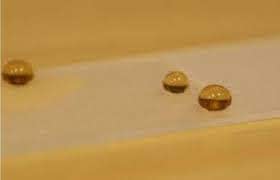
Why do Fallen Leaves Make Rails Slippery?
Advertisement
A team of engineers from the University of Sheffield, writing essays in British “Royal Society”, has come up with an explanation, and they describe how leaves interact with iron in the laboratory.

Every autumn, falling leaves can interfere with train operations. When the leaves are crushed, the rails form a black attachment - which is found to be as smooth as ice. Over-smooth contact surface leads to loss of traction, train speed or braking will be greatly restricted. In the new study, engineers are trying to better understand the nature of the black layer and the elements how it forms.
Advertisement
The researchers noticed that the leaves were only a problem when it rained, and they soaked the FIG leaves in a container of water until the water turned brown. They think the leaves exude an acid extract. Next, they added a drop of ferric chloride to the mixture to represent the iron dissolved in the rails. This makes the mixture darker. The researchers then applied the mixture to paired steel surfaces -- causing a sharp drop in friction between the steel surface and other objects in addition to sticking to the surface.

Next, the researchers removed the tannins from the same kinds of leaves and repeated the experiment on them - discovering that this prevented the mixture from turning black and did not cause skidding when applied to the steel surface. The researchers believe that it is tannin in the leaves that sticks to the rails and forms a slippery layer. Now that the mechanism is clear, and the researchers suggest developing a chemical that breaks down the tannins on railroad tracks. They also point out that railway managers could manage railway lines near trees and respond to the problem of falling leaves in a more environmentally friendly way if they knew they only needed to remove trees with high tannin content.
Advertisement
- Previous article
- Diamonds With the Proper Application of Heat and Enough Oxygen, Can diamonds burn?
- Next article
- A Bionic Four-Winged Bird-Wing Helicopter Drone Will Bring Revolution
Advertisement
RECENT NEWS
-

PUBG Mobile Esports Generated 200 Million Hours of Viewing in 2020
-

Mario Kart Tour Races to $200M revenue and 200M Downloads
-

Game Acquisitions Expand Globally in Q1 2021 with 280 Deals Worth $39 Billion Surpassing That in 2020
-

Free Fire Shows Strong Momentum, with Its Revenue Overtaking PUBG Mobile in a Single Market for Q1 2021
-

The Games Fund Launched a $50 Million Early Investment Fund to Invest in American and European Companies
-

How to Download and Install Wyze App for Free?
 1
1 1
1



